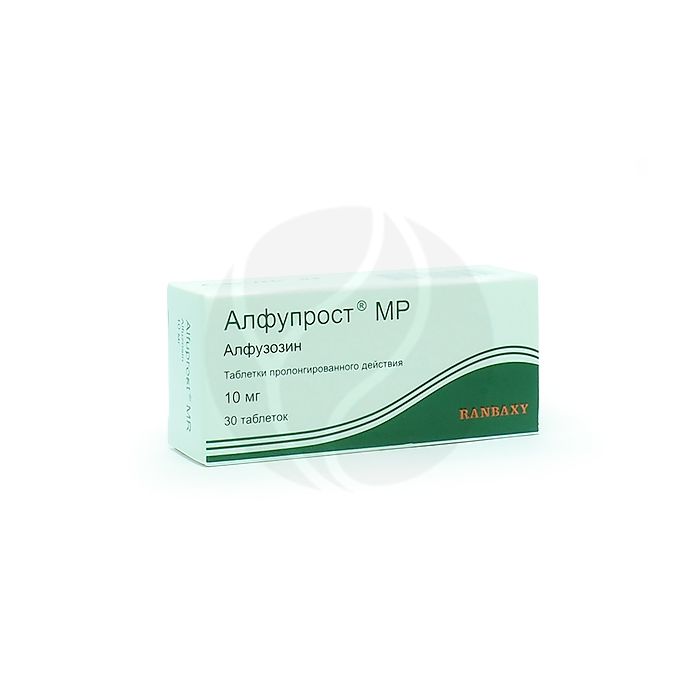Alfuprost MR tablets 10mg, No. 30
Expiration Date: 11/2025
Russian Pharmacy name:
Алфупрост МР таблетки 10мг, №30
Inside.
The recommended dose is: 1 prolonged-release tablet 10 mg daily after meals.
The tablets should be taken whole.
Sustained-release tablets from white to almost white, round, biconvex, without a shell; engraved with 'RY 10' on one side.
1 tab. alfuzosin hydrochloride (in granules) 10 mg
Excipients: granules: anhydrous lactose - 70 mg, colloidal silicon dioxide - 2 mg, povidone (PVP-K30) - 2 mg, talc - 0.5 mg, magnesium stearate - 0.5 mg; mixture for creating a tablet by compression: anhydrous lactose - 7 mg, hypromellose - 85 mg, hyprolose - 155 mg, povidone (PVP-K30) - 13 mg, colloidal silicon dioxide - 1 mg, talc - 2 mg, magnesium stearate - 2 mg ...
hypersensitivity to alfuzosin and / or other components of the drug;
orthostatic hypotension;
severe liver dysfunction;
severe renal failure (CC <30 ml / min);
congenital lactase deficiency, lactose intolerance, glucose-galactose malabsorption.
Clinical and pharmacological group: A drug used for urination disorders associated with benign prostatic hyperplasia.
Pharmaco-therapeutic group: Alpha1-blocker
Side effect
Definition of categories of frequency of side effects (according to WHO): very often (? 1/10), often (? 1/100 and <1/10), infrequently (? 1/1000 and <1/100), rarely (? 1/10 000 and <1/1000), very rare (<1/10 000).
From the hematopoietic system: very rarely - thrombocytopenia.
From the side of the central nervous system and psyche: often - weakness, a feeling of general discomfort, headache; infrequently - drowsiness, dizziness, cerebral ischemia in patients with ischemic brain disease.
From the side of the cardiovascular system: infrequently - tachycardia, palpitations, fainting, orthostatic hypotension, very rarely - angina pectoris in patients with coronary artery disease, atrial fibrillation.
On the part of the respiratory system: infrequently - rhinitis.
From the side of the organ of vision: infrequently - visual impairment, the frequency is unknown - intraoperative flaccid iris syndrome.
From the digestive system: often - nausea, abdominal pain, dry mouth; infrequently - diarrhea, vomiting; very rarely - damage to hepatocytes, liver disease with cholestasis.
On the part of the skin and allergic reactions: infrequently - rash, itching; very rarely - urticaria, angioedema.
Others: often - asthenia; infrequently - skin flushing, edema, chest pain; very rarely - priapism.

